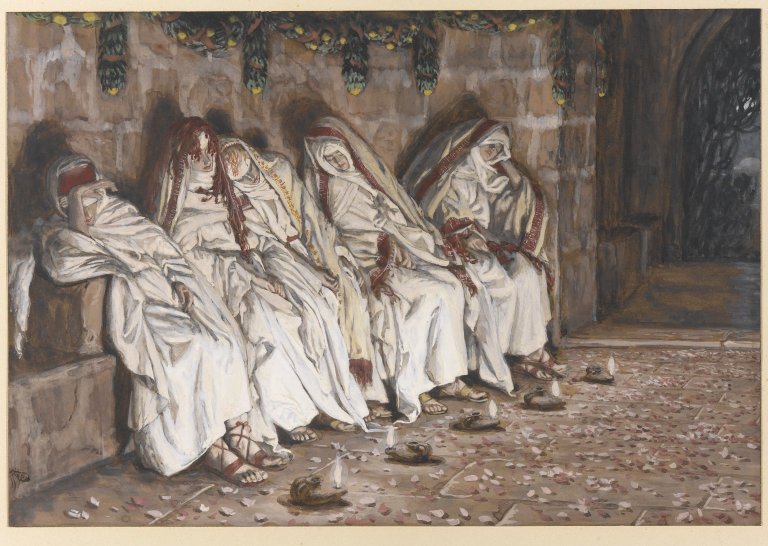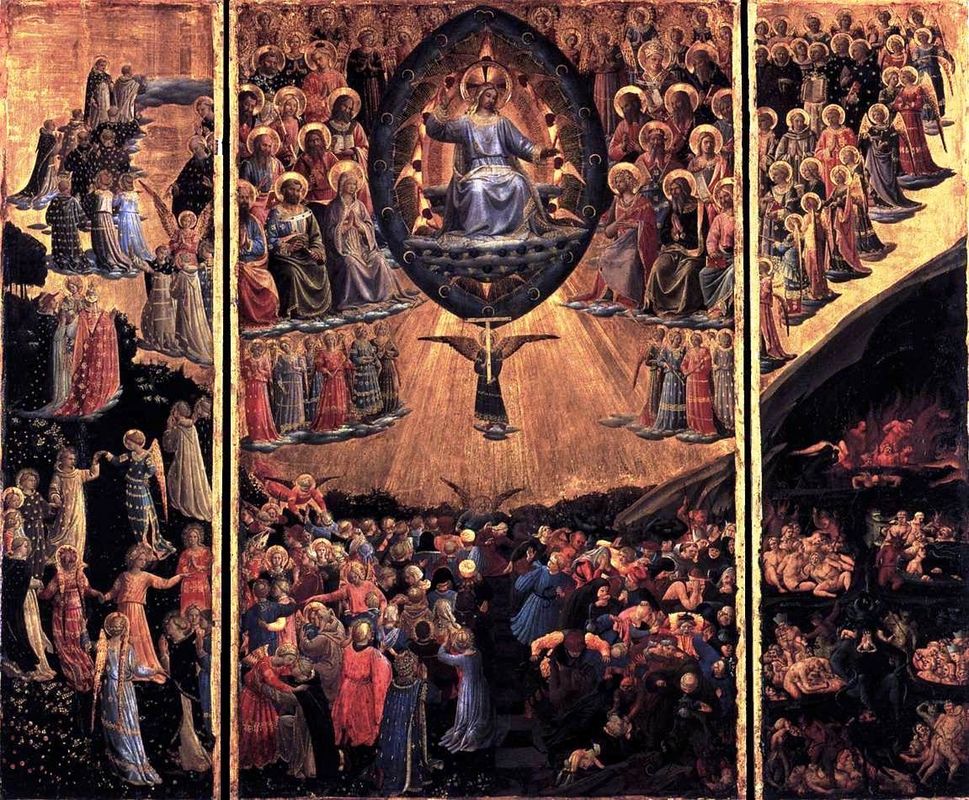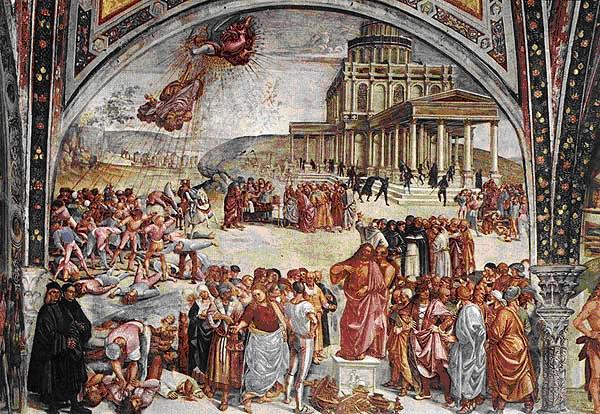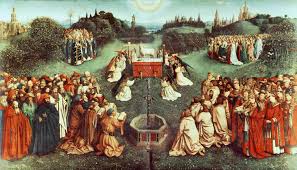November 25, 2018
The wise brought oil. The foolish did not bring oil. That makes sense. It is foolish to bring an oil lamp without oil and smart to bring oil. Yet, this is from God’s perspective, not man’s. The wise virgins Jesus speaks about here are not the wise of the world, but those thought to be foolish and naïve by men. And the oil they bring in their lamps is not the eloquent wisdom of philosophers and academics, but the foolishness of Christ’s cross. As St. Paul says, “For the word of the cross is folly to those who are perishing, but to those who are being saved it is the power of God. For it is written, ‘I will destroy the wisdom of the wise, and the discernment of the discerning I will thwart.” (1 Corinthians 1:18-19)
So, the wise at the end of the age, who will enter into the wedding hall, are not those considered wise in this world, but those found foolish by this world. An oil lamb needs oil to give light. The flame fed by the oil is saving faith, which gives you the right to enter into heaven. The oil, for which faith is entirely dependent, is the wisdom of God given by the Holy Spirit. This wisdom, which shames the wise in this age, is the preaching of Christ Jesus, who was crucified for sinners, as St. Paul again writes, “For since, in the wisdom of God, the world did not know God through wisdom, it pleased God through the folly of what we preach to save those who believe. For Jews demand signs and Greeks seek wisdom, but we preach Christ crucified, a stumbling block to the Jews and folly to the Gentiles, but to those who are called, both Jews and Greeks, Christ the power of God and the wisdom of God. For the foolishness of God is wiser than men, and the weakness of God is stronger than men.” (1 Corinthians 1:21-25)
But why do the wise find the cross of Christ so foolish? For many reasons. People cannot understand how God could credit the sins of the whole world onto an innocent Jesus or how his punishment on the cross could make atonement for all sins. Others question the justice of God, claiming that it would be wrong for God to demand such punishment from his only Son. To many, the vicarious atonement of Christ is barbaric and unacceptable. Some have even coined it “divine child abuse.” Many more find a problem with Christ’s resurrection from the dead, claiming it to be impossible.
While many find the idea of a suffering Lord unacceptable, many more find the idea of a suffering Christian equally intolerable. That God’s power is made perfect in our weakness makes no sense in a world of survival of the fittest. “Suffering is bad. Meekness is a losing strategy. Sorrow over sin is dwelling on the past and being self-defeatist. You must strive to overcome your troubles by becoming stronger and better.”
The greatest offense Christ’s cross commits against the wisdom of mankind is its assault on the human pride. To say that, “When I am weak, then I am strong.” is offensive, because strength must be found within. If I do my very best, God will accept me! This is the creed of the world. To cherish the cross of Christ, you must crucify your own human wisdom and pride, acknowledge the seriousness of your own sins and look to God for free salvation. That is, you must have true, godly wisdom.
But this cannot come from your own reason or intellect. Such wisdom, such oil for your lamp is only given by the Holy Spirit. “The natural person does not accept the things of the Spirit of God, for they are folly to him, and he is not able to understand them because they are spiritually discerned.” (1 Corinthians 2:14) This means that in order to have the wisdom of God, you must be taught by God. Proverbs 2:6 states, “For the Lord gives wisdom; from his mouth come knowledge and understanding.” This means that godly wisdom comes from the word of God.
“The fear of the Lord is the beginning of knowledge.” This statement is repeated several times in Scripture. It teaches us how we should approach Scripture. Yet, over the past few centuries a method of looking at Scripture, known as higher criticism, has become the dominant method in studying the Bible. Higher criticism aims to treat the Bible as “any other book” and in so doing, it questions the accuracy of what is written. Those, who reject higher criticism are called fools and are not taken seriously by the academic world. So, many, who don’t want to look like fools, try to have it both ways: treat the Bible like any other book and reject what seems too far-fetched to human reason, while still maintaining the Gospel. But we are not called to pick and choose what we want to believe from Scripture. Rather, in fear of the Lord we are called to hear the Word of God and keep it. This is how the Gospel is preserved among us. The holy Scriptures provide true wisdom that the world cannot give.
An oil lamp without oil is about as good as a flashlight without batteries. Yet, unless you tried to light the lamp, you might not know that the lamp has no oil. A lamp without oil may be useless, but it may also be very pretty, with fancy carvings and paintings on it. And that is how it is within the Christian Church on earth. The ten virgins all have lamps. You can’t tell who has oil, until the lamps are lit. So, Jesus teaches us that within the Christian Church on earth, there will be false Christians. They worship like Christians, they go to church, put money in the offering, and do good works. On the outside, they look like Christians. Yet, you don’t go to heaven for looking like a Christian. You go to heaven if you trust in Jesus Christ for the forgiveness of your sins, that is, if you have oil for your lamp.
Jesus says at the close of his Sermon on the Mount, “Everyone who hears these words of mine and does them will be like a wise man who built his house on the rock. … And everyone who hears these words of mine and does not do them will be like a foolish man who built his house on the sand.” (Matthew 7:24, 26) Notice, how both the wise man and the foolish man heard the words of Jesus. Not everyone, who hears the words of Jesus will be saved, but those who put their trust in Christ. God judges the inner heart. You can’t pretend to him. Having oil, which keeps your lamp burning, is trusting in the foolishness of Christ’s cross for your salvation.
This is why it is so important not only to be baptized and go through the motions of being a Christian, getting confirmed, showing up for services, etc. Being a true Christian and having wisdom from God is trusting in Christ. And this of course will cause you to come to church and hear God’s word and take it to heart.
Oil runs out and lamps grow cold. That’s just a matter of fact. And, so can your heart grow cold if it does not get replenished with the wisdom of God. This means that you must continue to hear the word of God. Of course, for those who trust in the Lord, this is not a burden. “Your word is a lamp to my feet and a light to my path!” says the Psalmist.
While hearing the word of God throughout your life, it is important that you hear not only the Gospel, which declares that your sins are forgiven for Christ’s sake, but that you also hear the Law. The Law is often despised, because it shows us our sins. Fornicators don’t want to hear that their fornicating is a sin. People with hot tempers don’t want to hear that their anger is a sin. Disobedient children don’t want to hear that their disobedience is a sin. And it goes on and on like this. Yet, it is important to hear the law for a couple of big reasons. First, your sins must be exposed to your conscience. When the law is preached to its fullest and you have nowhere to go, but to acknowledge that you are a sinner, then you are truly prepared to hear the Gospel. The Gospel is for sinners, for those who can claim no righteousness of their own, but must cling to Jesus for forgiveness and salvation. And Jesus forgives all sins.
Secondly, you should hear the law, because the law is good. It tells you how to love God and your neighbor. And as a Christian, who has the Holy Spirit dwelling in you, your desire it to do the will of God. And the will of God is revealed in the Law, which directs you to love as God has loved. So, it is important to listen to and learn the law of God, even when it points out your sin, as the Proverb says, “Do not reprove a scoffer, or he will hate you; reprove a wiseman, and he will love you. Give instruction to a wise man, and he will be still wiser; teach a righteous man, and he will increase in learning.” (Proverbs 9:8-9)
Yet, however important it is to hear the law, the Gospel must predominate. Because, it is not by following the law that you will be saved, but through believing the Gospel. The Gospel is the oil, which keeps your saving flame alive. Jesus warns that you know not the day or the hour when Christ will return and St. Paul says that the day of the Lord will come like a thief in the night. Yet, you will not be caught off guard when you have faith in the salvation Christ has won for you. St. Paul tells us to prepare ourselves by putting on the breastplate of faith and love, and for a helmet the hope of salvation. “for God has not destined us for wrath, but to obtain salvation through our Lord Jesus Christ.” You can only have such certainty that God has destined you for salvation if you hold fast to the foolishness of the cross, which is the true oil for your lamp. Christ has secured your salvation through his death on the cross and resurrection from the tomb. With such faith, you will not be put to shame. With such faith, you are prepared whenever that Day will come. Amen.




 RSS Feed
RSS Feed